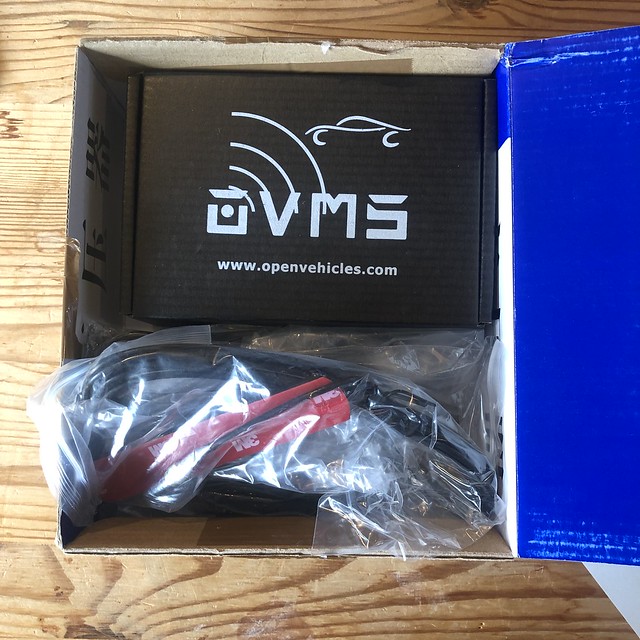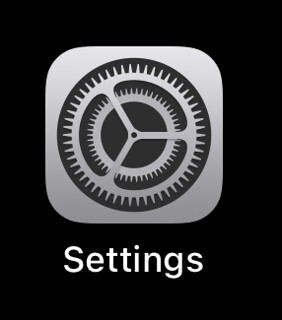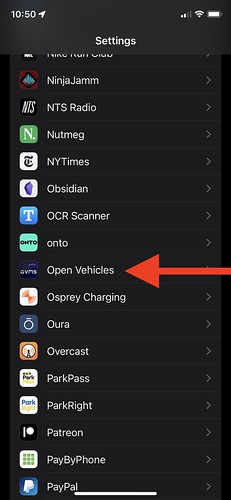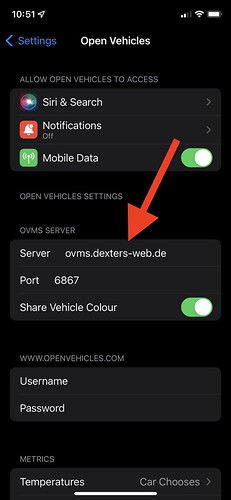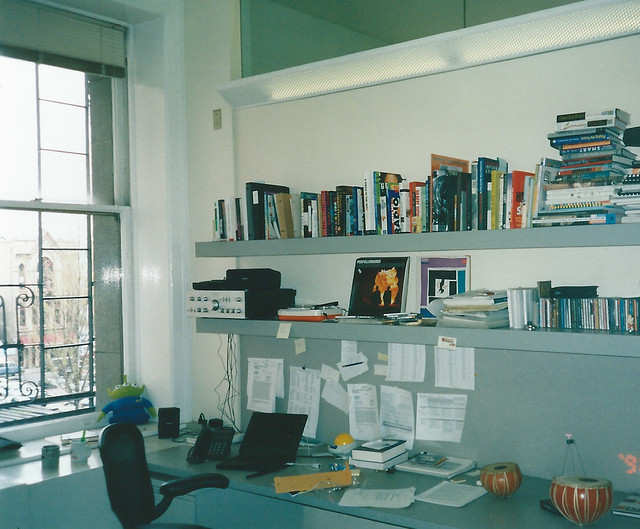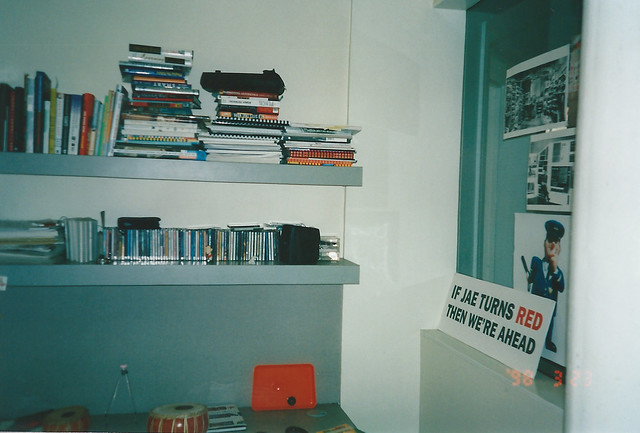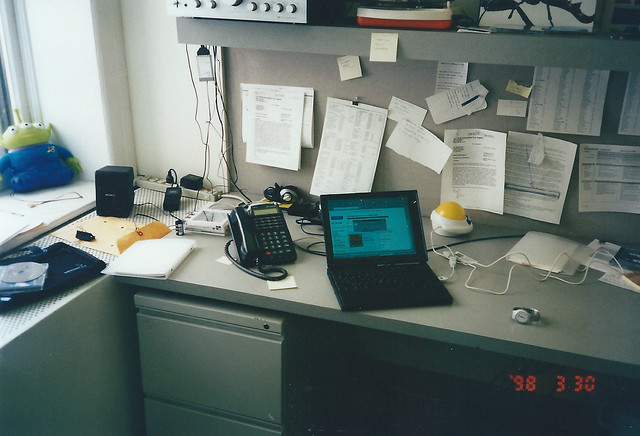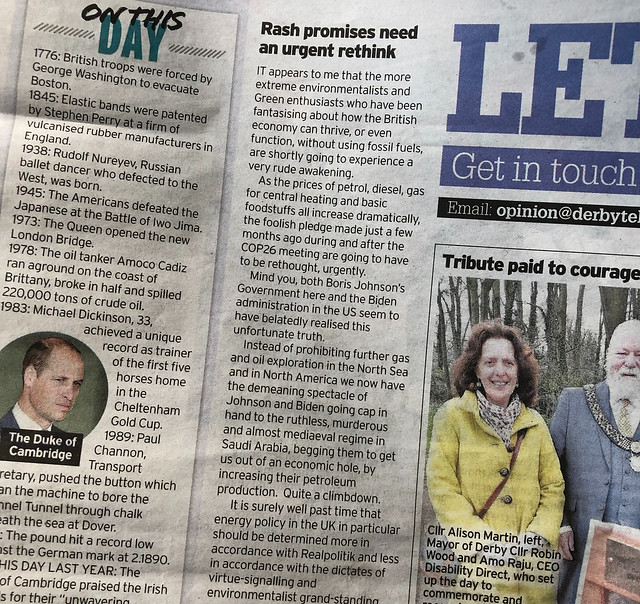From Alan Bennett's diary 2015: "1 April: Almost out of piety and a respect for tradition I filch a couple of branches from the base of a balsam poplar on the north side of Regent’s Park. The buds are hardly open and thus are briefly heavily scented. Now in a glass on the sitting-room mantelpiece they bring a flavour to the room as they have done every spring for the last forty years."
Russell Davies
As disappointed as you are
About | Feed | Archive | Findings | This blog by email
Philip Jeck
Philip Jeck died earlier this week. He seemed a kind and interesting man. And generous. I saw him play at Cafe Oto once and was immediately curious about how he made his sounds. His record players were obvious but there was clearly other stuff going on. A bit of googling and I found this interview where he told all his secrets. My obsessions with Casio SK-1s and Sony MZ-R35 minidisc players started there.
My friend Ben interviewed him back in 2008 and it's a splendid listen. (Also on soundcloud, if you prefer)
Here's him doing what he did.
And here's a good intro. Avant garde but not po-faced. And not too avant.
March 31, 2022 | Permalink
Paying and not paying attention
This is wonderful about paying attention. (From an interview by Rachel Syme with Laucy Dacus)
'She mentioned a game that she used to play on car trips. "It's called Fall in Love with a Tree," she said. "The first tree you see in the distance, you just look at it and notice everything about it that makes it more special than the other trees.
She figured that the exercise could easily be applied to buildings, and homed in on a glass tower in the financial district.
"I'm picking it because it's not as noticeable," she said. Suddenly, a halo of white lights began to glow on the building's roof. Dacus smiled. "I made it light up."'
Which reminds me of something Clive James once said (apparently):
"Happiness is a byproduct of absorption”
All of which is very pro-attention, like:
"The Zen master Ikkyu was once asked to write a distillation of the highest wisdom. He wrote only one word: Attention. The visitor was displeased. “Is that all?” So Ikkyu obliged him. Two words now. Attention. Attention."
(Dept. Of Speculation - Jenny Offill)
But unfocusing that attention is also good:
"The economist John Maynard Keynes once offered advice on how to conduct oneself in a bookshop: A bookshop is not like a railway booking-office which one approaches knowing what one wants. One should enter it vaguely, almost in a dream, and allow what is there freely to attract and influence the eye. To walk the rounds of the bookshops, dipping in as curiosity dictates, should be an afternoon’s entertainment. This is very different to the advice you’d give someone on how to use Google, which, in Keynes’s terms, is more like a railway booking-office – a place to visit when you know your destination. But a truly curious person knows that she doesn’t always know what she wants to know about."
Or at Tom puts it you can 'rewild you attention' Which led to a trail of good thinking including CJ and this from Ali Montag about trying to escape attention when thinking about your work and the advantage of the attention of a small group of friends.
MG ZS EV OVMS iOS installation
I'm mostly writing this in case its of use to a future person googling "MG ZS EV OVMS iOS installation" like I was a couple of days ago.
This won't be of interest to the casual reader (hi Ben!)
If you've bought pre-2022 MG EV you'll have realised that there's no app available in the UK. The main downside of that is that when you plug into a public charging station and walk away to get a cup of coffee you can't tell how much you've charged and keep having to come back and check. There are other irritations but that's the main one for me.
You can fix this by installing an open source device on the ODB port of your car and installing a free app. The open source device is not free. It's about £200. You can get it from OpenEnergyMonitor. It comes with a SIM card so it can transmit data. If you have a right-hand drive MG ZS you want the "Generic OBD2 Cable (right)".
When your box arrives it will look like this:
Then you have to install it. It looks daunting but it's pretty straight forward, you just have to follow lots of instructions. It seems to be around the same technical level as installing a smart TV on your wifi. You just have to have the confidence to plough through technical documents which are aimed way over your head. Fortunately there's a great video to help you.
This is the installation guide. It's clear and well-written and comprehensive. But, for the casual just-want-to-get-the-app-running user it's too comprehensive. There's lots you don't need to know about but which you're not sure if you need to understand. That's where Mr EV comes in.
His video will tell you how to get it all done. Watch it first, then go through it bit by bit along with the instructions. It is really clear and helpful and well shot.
The only places where I struggled were:
- At 14:38 when he says "enter your module details" it wasn't obvious to me that the username has to be 'admin' not your module username.
- At 16:20 I went a bit fast and pressed 'proceed' before I'd set up the hologram account. Just take your time and do what Mr EV tells you.
- I think the hologram options have changed a little since the video was recorded. The account options seem to have changed a little, but it's OK you can still get a very cheap one.
But, basically, follow all those instructions and you should be OK.
And physically plugging it into the ZS is also straightforward. The ODP port is not behind a specific panel as in the video, it's just sort of there, behind the plastic bit down below the right of the steering wheel. I want to say 'dangling' but it's not that loose. Maybe 'exposed' is the right word. It plugs in straight-forwardly. I haven't worked out yet what to do with the box and wires, for now I've just stuck them in the door storage thingy.
The wrinkle I struggled with was getting the app connected. It seems insoluble - but don't worry, it's soluble!
To get this all working you need to get an account set up with an OVMS server. There's an Asia-Pacific one at https://www.openvehicles.com/ and a European one at https://dexters-web.de/. It doesn't seem to matter which one you use except the iOS app seems to be automatically configured as though you're using the Asia-Pacific one. And this is a bit hard to spot.
So, you should set up the settings in the actual app as directed. This is pretty clear. But, then, if you're using iOS and the dexters-web account you have to go the iOS settings app (this one)...
And you have to scroll down until you see the Open Vehicles app...
And you have to go in there and change the server setting to ovms.dexters-web.de...
Until you do that it won't work. And it won't tell you why not. I had to dive pretty deep on the forums to work out what was going on.
And that's it. Hope it helps. Good luck.
March 29, 2022 | Permalink
Do you want to know a secret?
If you're going to ask good questions you should probably listen to the answers. As Caroline Webb says in How to Have a Good Day:
"Merely by saying “Tell me more about that,” you’ll be in the top percentile of listeners that anyone will meet today"
Which is true. And easy to say. But it's worth recognising that listening is hard.
"The reason it’s hard to focus on a conversation with your spouse isn’t that you’re surreptitiously checking your phone beneath the dinner table. On the contrary, ‘surreptitiously checking your phone beneath the dinner table’ is what you do because it’s hard to focus on the conversation – because listening takes effort and patience and a spirit of surrender, and because what you hear might upset you, so checking your phone is naturally more pleasant." (Four Thousand Weeks - Oliver Burkeman)
We have to give up what we really want to do, talk:
"I’ve noticed that Margot listens differently than I do. She pays attention, but leaves her own stories out of it." (Weather - Jenny Offill)
Or as Russell T Davies said:
"Dialogue is just two monologues clashing. That's my Big Theory. It's true in life – never mind drama. Everyone is always, always thinking about themselves. It's kind of impossible to do otherwise."
Which is why it's a job:
"Many of us have a limited threshold for how much venting we can listen to, even from the people we love, as well as how often we can tolerate this venting while not feeling listened to ourselves. Relationships thrive on reciprocity. That’s one of the reasons why therapists charge us for their time and friends don’t." (Chatter - Ethan Kross)
And a skill:
"This is a principle that hostage negotiators understand. They often have to de-escalate situations that are on the verge of chaos. In order to do that, Professor William Donohue told me, they try and provide a structure through which the hostage-taker can express himself. ‘The negotiator enters this highly contentious, identity driven, emotionally fraught moshpit of confusion, and they have to impose order on it. They feed back what they’re hearing in a structured manner: “The first thing you’re concerned about is this, the second thing is this …”’ Experts in tough conversations are trained to do this, but as Donohue pointed out to me, it’s something skilled communicators do instinctively: ‘A good friend listens to your emotional diatribe and helps you find a shape for it. They turn your mess into something you can get a handle on – so that you can do something about it.’ (Conflicted - Ian Leslie)
Which makes proper listening a gift:
In the words of adrienne maree brown, “What we pay attention to grows, so I’m thinking about how we grow what we are all imagining and creating into something large enough and solid enough that it becomes a tipping point.” (All We Can Save)
And
"...she ran the conversation like a world-class tennis player, serving generously, returning every ball." (Crudo - Olivia Laing)
And
"What we need most of all, more than prizes, is a sense that we have been attended to, listened to and worried about. We want our existence to be acknowledged and noted. In my life I have felt happiest not when being flattered but when being fully held in someone else’s head, if only for a few moments. The best compliment you can pay someone is not to pepper them with applause emojis but to be interested in what they say and do. We just need to be noticed – or loved, which is the same thing." (If You Should Fail - Joe Moran)
Take a lot of pictures
This is from Satin Island by Tom McCarthy:
"Bronisław Malinowski, the father of modern anthropology, said: Write Everything Down. That was his First Commandment. You never know (he reasoned) what will turn out to be important and what won’t; so capture it all, turn it all into data."
It is useful. But in the modern world it seems like you can't help but write stuff down. Your emails, your documents, your thoughts, they seem to archive themselves. I always, always wish that I'd taken more photos. Not of sunsets and birthdays and loved ones, I've got loads of those. But of moments and colleagues and little victories. Of offices and corridors and car parks. The places where I lived a lot of life. Partly because these things come in handy when you want to talk about them later and sometimes that's a professional necessity. But partly because I want to remember that stuff.
This, for instance, was my office in the Dekum Building at w+k for about two years in the late nineties. It was a fantastic office. But these are the only photos of that whole part of my working life. It was important, if only to me.
This also brings to mind a splendid bit of Susan Sontag, which seems both a bit elliptical and a bit circular. “A photograph could also be described as a quotation, which makes a book of photographs like a book of quotations.”
Questions, questions
A correspondent writes to tell me that a good advisor asks good questions (as well as offers encouragement).
Which is an excuse for this blog post - a small bundle of questions I've collected.
This is probably the thing I've said to most people over coffee. And the thing that's made the most difference to what I do at work. I really try and do this. And these are great questions.
"So, each and every week these leaders have a brief check-in with each team member, during which they ask two simple questions: What are your priorities this week? How can I help?"
From Nine Lies About Work
And then there's the question which I seem to have misremembered and stolen credit for in this interview. I think of it as "What are you really good at, which is also really hard?" But I think I got it from Scott Galloway.
It's a great strategy question, a good interview question. And can fill a lull in conversation.
And speaking of lulls in conversation...Leil Lowndes has a lovely suggestion for upgrading your small talk gently. Don't ask new people 'what do you do?' ask them 'how do you spend your time?'. This gives them much more freedom to answer interestingly, revealingly or playfully.
Caroline Webb has a bunch of similarly useful alternative suggestions in How to Have a Good Day:
Not “Have you thought of XYZ?” but “How are you thinking about this?”
Not “Is the reason you’re struggling because this is all new to you?” but “What’s making it feel hard?”
Not “Could you make things better by delegating more?” but “What would the ideal situation look like for you?”
And if you want to ask about people’s personal lives, you could get beyond the normal “How was your weekend?” with a question like “What do you do outside work? How did you develop an interest in that?”
She also says this:
"When I’m in a group that’s discussing an important issue, I actually like to go one step further. Whether or not I’m chairing the meeting, I suggest that everyone—even those who’ve already spoken—answer a thought-provoking question, such as: “If there were something we were missing here, what would it be?” “If there were a completely different way to see this, what would it be?” “If there were one thing that worried you about this, what would it be?”
And, if we're discussing questions we shouldn't forget Arthur Aron and Elaine Spauling's 36 questions designed to create intimacy amongst strangers. I've never asked anyone these myself, but it feels like it'd be good food for thought if you were trying to create strong relationships in all sorts of contexts. As they say: ‘one key pattern associated with the development of close relationships among peers is sustained, escalating, reciprocal, personal self-disclosure’.
And Laurie Anderson's questions always make we want to think of more interesting things to ask. Like Oblique Strategies without the Big Tarot Energy.
And then, of course, there's the importance of not asking questions. Like this bit from Agency:
"Netherton said nothing, something he’d only recently been learning to deliberately do."
Or, indeed.
Do you actually want advice?
Dan Cullum's distinction between coaching and tactics is very useful.
"Do you want some coaching—where I ask you questions and you figure out the answers—or do you want tactics?"
As is this from Designing Your Life "We make a clear distinction between counsel and advice. “Counsel” is when someone is trying to help you figure out what you think. “Advice” is when someone is telling you what he or she thinks.
You need a terrible gardener
A lesson I've learned slowly and hard is that advice is a terrible thing to give.
I, personally, find it very hard not to just anecdote and assume that'll do. Ignoring all privilege, survivor bias etc. But most advice is a variety of this pointed tweet from Peter Yang:
"Just had a call with someone on Forbes 30 under 30 list and came away really impressed.
He shared with me how he made VP at a top tech company before age 30:
4:30 AM wakeup
2. Cold showers
3. Gratitude journal
4. Meditate
5. Dad owns tech company"
That's probably why I normally end up saying some variant of 'I read this interesting thing once, it might be relevant in your circumstances'. That's really what this whole project is. And that's valid, right? Books can be mentors:
"Who was or still is your mentor?
Multiple mentors in the form of books. I never had any personal contact with Raymond Williams but Culture and Society meant the world to me. At the same time that I was reading Williams in my early twenties, I was lucky enough to share a slum with a friend, Chris Mitchell, who was interested in many of the same things as me. Friends are always preferable to mentors."
So here's some advice about advice: beware advice from successful people. Summed up by Tamar Haspel talking about gardening.
"A lot of first-timers are making the same mistake: They’re listening to experts. Experts can make things grow that you can’t, because they are experts. What you need is a terrible gardener to tell you what anybody can grow."
I used to be obsessed with all those articles about the habits of successful people. How they got up at 5am to read Sun Tzu on their rowing machine. It took me a while to realise that the habits were normally enabled by success, not producers of it. You can do all that if someone is also looking after your kids, your laundry and your inbox.
Rachel Syme puts it better in a lovely piece in the New Yorker about deadlines.
"Mason Currey's "Daily Rituals" books (which have been translated into more than half a dozen languages) impart the quotidian habits of creative types from Albert Einstein to Twyla Tharp. Benjamin Franklin started his day with "air baths"-reading and writing in the nude until he had something else to do-and Edith Wharton wrote longhand in bed, "on sheets of paper that she dropped onto the floor for her secretary to retrieve and type up." All these glimpses into the lives of Highly Effective People can seem like recipes for success, but read enough of them and you may conclude that the secret ingredients are not much sleep and a lot of professional help."
And Viv Groskop makes a similar point in How to Own the Room:
"Lots of women say, ‘If I was going to be a speaker, I’d want to speak like Michelle Obama.’ But if you had Michelle Obama’s support system, you probably would be able to speak like Michelle Obama very easily."
Cory writes along the same lines in this piece about 'breaking in' as a writer
He ends with the real point of all this:
"Established writers know nothing useful about breaking into the field today. But we do have a powerful tool for helping out new writers: encouragement. The specifics of breaking in change enormously from year to year, but one thing remains eternal: breaking in is hard, and it’s easy to get discouraged. The kindnesses we show to would-be writers are worth far more than any list of markets or tips on writing cover letters."
That's probably mostly what I'm trying to offer over coffee with people. Encouragement. So let me know if you need some.
Rash promises and Realpolitik
I read this letter in our local paper the other week. It made me cross so I emailed this reply:
hello,
I was delighted to read XXX's plea for energy policy realism in Thursday's paper. He's completely correct. We need to ignore the idealists & extremists and prioritise British national interests and low-cost energy.
This means:
1. The rapid development of the cheapest energy to commission, install and supply: wind. An energy technology the UK is uniquely placed to exploit
2. The urgent creation of grid scale batteries to manage this energy, further reduce costs and create British jobs
3. The abandonment of ideological fantasies about uneconomic, unfundable schemes like fracking and the re-exploitation of UK fossil fuels. We can't afford these unrealistic, unpatriotic pipe-dreams
It's not a very good reply. I was mostly just being snarky. That's probably why they've not printed it. But in constructing my snarkasm I realised some of what was making me cross.
I don't think we should allow the forces of fossil fuelism to seize the high ground of pragmatism and being realistic and patriotic. Fracking is idealogical, not sensible. This obviously isn't an original thought but this interview with Lisa Fazio reminded me that it's not enough to rebut misinformation once, you just have to keep at it, again and again and again.
"Unfortunately, memories fade, and current evidence is that debunkings fall into the same category as everything else. A week later, or a couple of weeks later, you’ve forgotten it. You might also forget the false information too, but if you keep seeing it again, then a one-time correction isn’t doing too much for you. A good example was the situation with the Sharpies in Arizona. If one time you read a debunking that it wasn’t actually evidence of election fraud, but then later you see 20 posts talking about it being fraud, that one correction doesn’t have much of a chance."
And this seems to resonate with Cory Doctorow's post about Peak Indifference...
"An activist understanding of peak indifference demands that we work to hasten the moment of peak indifference, by helping people imagine the trauma before they actually experience it. For me, that involves narrative work: spinning utopias ("We can fix this") and dystopias ("We must fix this…or else").
But all the other activist tactics fit in this frame, too: education, organizing conversations, etc.
And the point of that activism isn't just to create partisans. It's to channel the sense or urgency into positive, anti-nihilistic directions: to counter ecofascism with climate justice, land healing, and remediation."
Linking to Cory. Classic blogging.
